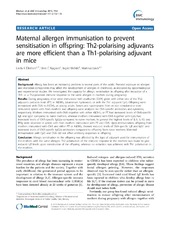| dc.description.abstract | Background Allergy has been an increasing problem in several parts of the world. Prenatal exposure to allergen and microbial components may affect the development of allergies in childhood, as indicated by epidemiological and experimental studies. We investigated the capacity for allergic sensitisation in offspring after induction of a Th1- or a Th2-polarised immune response to the same allergen in mothers during pregnancy. Results During pregnancy, mice were immunised with ovalbumin (OVA) given with either one of the Th2-adjuvants pertussis toxin (PT) or Al(OH)3 (aluminium hydroxide), or with the Th1 adjuvant CpG. Offspring were immunised with OVA in Al(OH)3 as young adults. Serum and supernatants from ex vivo stimulated or non-stimulated spleen cells from mothers and offspring were analysed for OVA-specific antibodies and cytokines, respectively. Mothers immunised with OVA together with either Al(OH)3 or PT had increased levels of OVA-specific IgE and IgG1 compared to naive mothers, whereas mothers immunised with OVA together with CpG had increased levels of OVA-specific IgG2a compared to naive mothers. In general the highest levels of IL-5, IL-10, and IFNγ were observed in spleen cells from mothers immunised with PT and OVA. Upon immunisation, offspring from mothers immunised with OVA and either PT or Al(OH)3 showed reduced levels of OVA-specific IgE and IgG1 and increased levels of OVA-specific IgG2a antibodies compared to offspring from naive mothers. Maternal immunisation with CpG and OVA did not affect antibody responses in offspring. Conclusion Allergic sensitisation in the offspring was affected by the type of adjuvant used for immunisation of the mothers with the same allergen. Th2 polarisation of the immune response in the mothers was found to give reduced IgE levels upon sensitisation of the offspring, whereas no reduction was achieved with Th1 polarisation in the mothers. | en_US |

